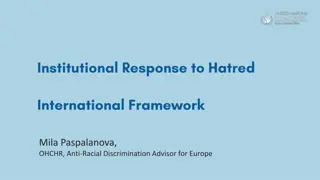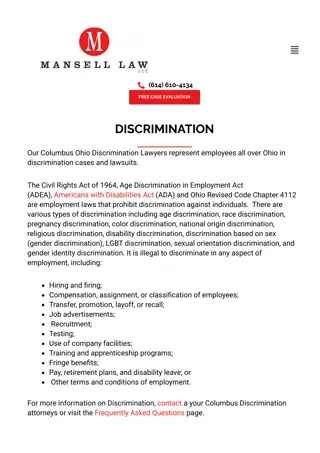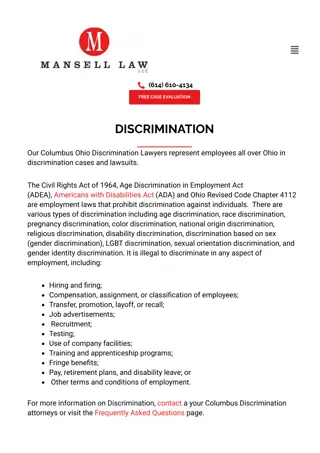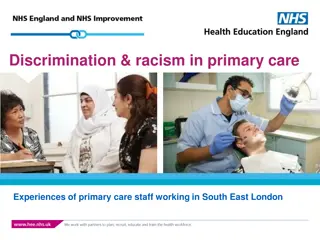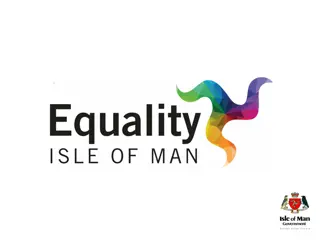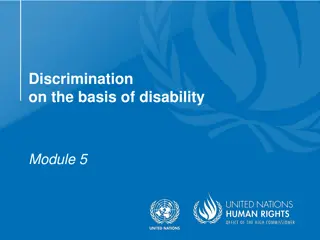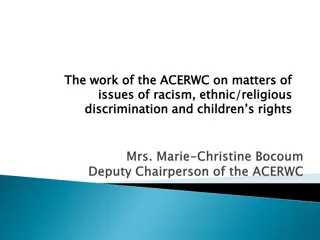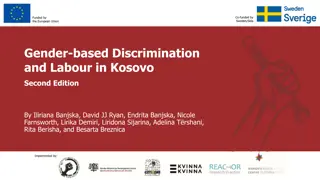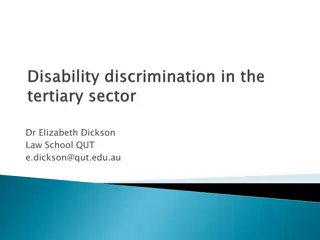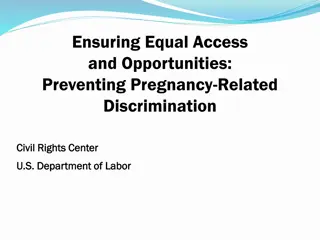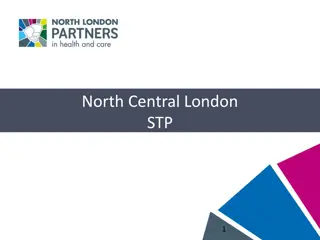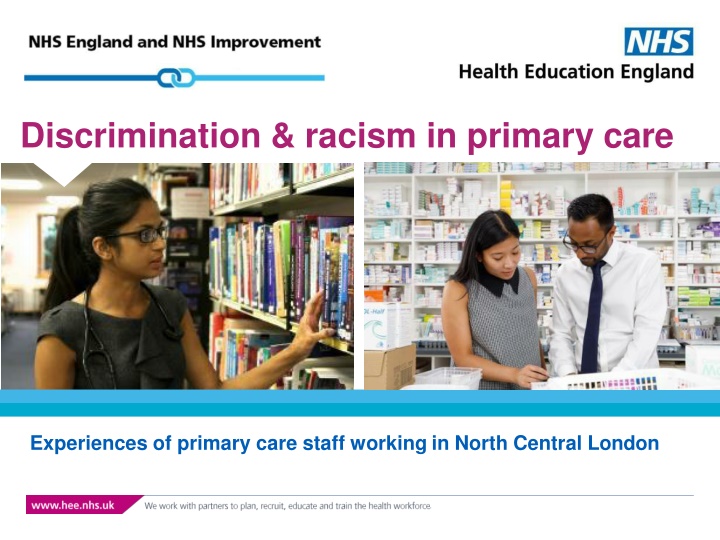
Discrimination and Racism in Primary Care: Insights from North Central London
Explore the experiences of primary care staff in North Central London regarding discrimination and racism in a pioneering pan-London survey conducted in 2021. The survey involved 1025 primary care team members, with 176 from North Central London, shedding light on the diverse roles, demographics, and ethnicities of the participants.
Download Presentation

Please find below an Image/Link to download the presentation.
The content on the website is provided AS IS for your information and personal use only. It may not be sold, licensed, or shared on other websites without obtaining consent from the author. If you encounter any issues during the download, it is possible that the publisher has removed the file from their server.
You are allowed to download the files provided on this website for personal or commercial use, subject to the condition that they are used lawfully. All files are the property of their respective owners.
The content on the website is provided AS IS for your information and personal use only. It may not be sold, licensed, or shared on other websites without obtaining consent from the author.
E N D
Presentation Transcript
Discrimination & racism in primary care Experiences of primary care staff working in North Central London
Pioneering pan-London survey All NHS staff deserve to work in an environment that is safe, welcoming and free of discrimination. In November/December 2021 all primary care staff in London were invited to complete a short anonymous online survey to say whether or not they had experienced discrimination at work over the past 12 months. The survey was advertised in meetings, newsletters, social media, mailing lists and through HEE, NHSEI, Primary Care School, LMC, LPC, LDC, ICSs, PCNs, Training Hubs, EDI leads, PM Fora and networks. This document sets out the feedback from North Central London.
Who shared their experiences? 1025 primary care team members from across London took part. 176 people worked in North Central London. North Central London 176 North East London 286 North West London 134 South East London 244 South West London 181
Who shared their experiences? The roles of the 176 people responding from North Central London are below. This represents about 5% of the primary care workforce in North Central London. 38% GP - salaried, partner or locum Practice Manager 17% Administrative, clerical, reception or IT roles 10% General practice nurse or ANP 9% Optometrist, optician, optical assistant Pharmacist, pharmacy technician 6% 4% 5% Other supporting clinical roles Other patient care roles e.g. health coach 4% Other management roles e.g finance, business 2% Dentist, dental nurse or other clinical dental Other roles e.g. paramedic, student 0% 5%
Who shared their experiences? The age, gender and ethnicity profile of the 176 people who took part in North Central London was broadly representative of the primary care workforce in the area. 32% Non- binary and other 0% Female 78% 25% 23% 15% 5% Male 22% 1% 16-20 21-30 31-40 41-50 51-65 66+ yrs
Who shared their experiences? Asian/Asian British - Indian 21% Asian/Asian British - Pakistani 5% Asian/Asian British - Bangladeshi 2% Asian/Asian British - Chinese 2% Other Asian/Asian British 5% Black/Black British - African 7% Black/Black British - Caribbean 6% Other Black/Black British 2% White - British White - Irish 31% 4% Any other White background 10% Arab 2% Any other background 4%
Discrimination and harassment Below are the proportions who said they had experienced discrimination or harassment due to their personal characteristics at work in the past 12 months. 49% said they experienced some type of discrimination. 18% Due to ethnicity 27% 7% Due to gender 14% 8% Due to age 13% 2% Due to religion 5% 2% Due to disability 1% 1% Due to sexual orientation 2% Discrimination from staff Discrimination from patients 2% Due to other characteristics 1%
Perceived racial discrimination Below are the proportions of people from different ethnic backgrounds who said they had personally experienced racial discrimination or harassment in the last 12 months. Discriminated against by patients 27% 42% 50% 3% 11% 60% Discriminated against by staff 18% 24% 46% 2% 6% 40% Ethnic background Total, all ethnic groups Asian or Asian British Black or Black British White British or Irish Any other White background Any other background
Racial discrimination - past year People from minority ethnic backgrounds were more likely to feel their ethnicity had reduced their career progression and training opportunities in the past year. % Asian % Black % White British/ Irish % Other White % Any other 95 83 78 62 60 50 40 35 38 31 30 30 19 25 17 15 17 11 5 2 My organistion acted fairly about promotions and progression, regardless of ethnicity My ethnicity reduced my chances of promotion or progression My ethnicity reduced my opportunities for training I saw a colleague discriminated against due to their ethnicity
Racial discrimination past year People from minority ethnic backgrounds were more likely to say that they considered leaving their role due to racial discrimination in the past year. % Asian % Black % White British/ Irish % Other White % Any other 40 30 20 20 19 19 15 10 10 6 6 6 5 5 4 4 3 2 0 0 0 0 0 0 0 Senior colleague Patient complained discriminated Colleague Had performance measures or disciplinary action due to my ethnicity Considered leaving or left due to racial discrimination about me due to complained about against me due to my ethnicity my ethnicity me due to my ethnicity
Impacts of racial discrimination 60 people shared a recent experience of perceived discrimination or harassment based on their ethnic background. Most said that the most recent instance involved subtle or underhanded comments or actions. Examples of perceived discrimination included: Subtle or underhand comments or actions, 70% racial slurs / stereotyping being undermined or put down not being listened to, treated with respect or promoted patients wanting to see someone else Direct comments or actions, 20% People said this led them to: feel undervalued, unsupported, demoralised have significant mental health concerns leave the job or go on sick leave Aggressive or threatening behaviour, 10%
Examples of discrimination My employers bullied me and made sexist and racist comments to me and other members of staff from the same mixed background as myself. They commented on my religion and would say I m going to hell because I don t believe what they believe. They failed my probation with no valid reason. One of our receptionists was called a n**ger by a patient and I witnessed this patient assault other receptionists by throwing something at them and shouting. I was distressed by this incident but more deeply distressed by what I perceived as a lack of leadership and action taken by my practice. The junior practice manager arranged removal of the patient, however not a single partner spoke to myself or any of the receptionists involved. I am regularly told by patients that there are too many Indians in the NHS, other people don t have a job since yourlot arrived and all opticians are Pakis now. Colleagues stand by and say nothing.
Reporting racial discrimination Of the 60 people who described their experiences of racial discrimination, 42% said they or someone else reported the most recent incident. Only 1 in 10 said they reported it and it was dealt with well. 12% I reported and it was dealt with well 22% I reported but not dealt with well Someone else reported 8% 43% Did not report as thought nothing would be done Did not report as worried about consequences 18% Did not report as did not know who to report to 15% Dealt with issue directly with person 3% People could give more than one reason for not reporting Did not feel need to report 3%
Do people know what to do? Regardless of whether they experienced discrimination, we asked if people knew where to get help with ANY harassment or discrimination at work. Many said they knew where to go for help, but people from minority ethnic backgrounds were least likely to feel confident that anything would be done. % Asian % Black % White British/ Irish % Other White % Any other 89 89 85 83 83 82 70 70 62 54 54 53 50 50 49 I know where to go for help to deal with any harassment or discrimination I see or experience at work I would feel secure raising concerns about harassment or discrimination where I work I am confident that my organisation would address concerns I raise about harassment or discrimination
What are the top priorities? 47 people suggested practical things to tackle racial discrimination or harassment (regardless of whether they had experienced any): Training about diversity and unconscious bias for all staff (32%) and helping people feel confident to raise and deal with issues (13%) Recruiting diverse people to (senior) roles and setting diversity targets (28%) Independent body to investigate and support, including advice helpline and anonymous reporting (17%) Zero tolerance campaign, informing patients about what is unacceptable and making it easy to remove patients from the register (13%) Safe spaces to discuss and report issues, including meetings, website forum and regular surveys like this (13%) Standardised policy and protocols for responding (6%) and more promotion of the process for reporting and getting support (4%)
What are the top priorities? People need to be held accountable for their actions. People want to report the behaviour of senior staff but are too scared to do so out of fear we will lose our job. There is a very strong racial bias and racist undertone especially in senior management. It is very alarming and concerning. There needs to be more support. At GP practices there is no transparency on how staff are treated and why they leave. The GP partners have ultimate control and as such the culture becomes very tight knit. They will not address behaviours from individual partners even when this is quite clearly discriminatory. We need independent help. Raise awareness it is not just people of colour who experience racism. Being White non-British is like having a hidden disability. No one is willing to acknowledge the racism that occurs.
What have we learnt? 49% of people responding from North Central London said they experienced some type of discrimination or harassment due to their personal characteristics at work last year. 27% said they experienced racial harassment or discrimination from patients and 18% from colleagues or managers. 42% of recent instances of racial discrimination were reported, but most said the issue was not dealt with well. Asian and Black people were more likely than others to say they had experienced racial discrimination, but were less likely to know where to get help and less likely to feel confident about raising issues. The most common suggestions to help address racism at work were training for all team members, recruiting a more diverse range of people to leadership positions, and an independent group to give advice and investigate.



